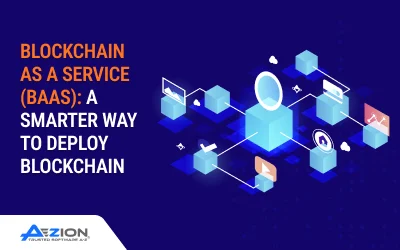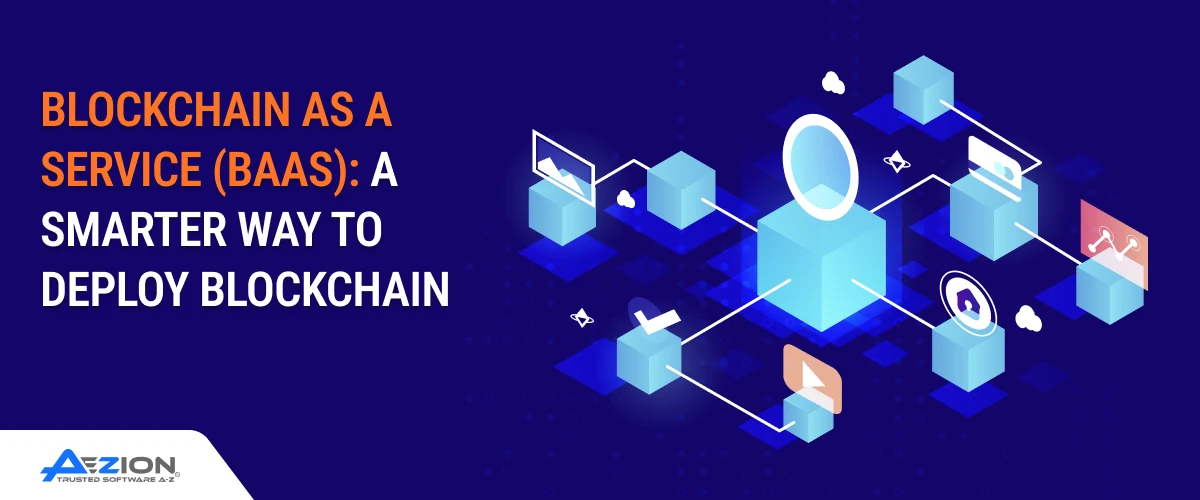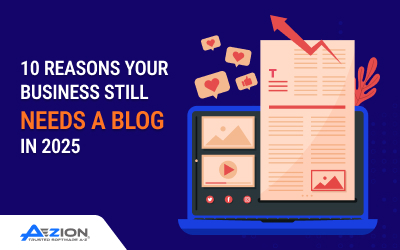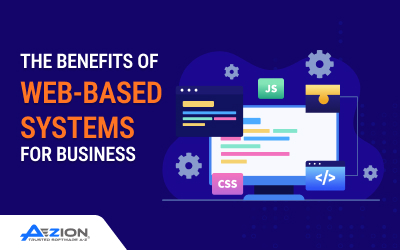Summary
Blockchain as a Service assists businesses in adopting blockchain technology without dealing with complex infrastructure or development costs. From the supply chain industry to finance, it allows for secure, scalable deployment options for enterprise use. This blog post examines its working model, business benefits, top providers, real-world use cases, and future relevance.
Introduction
The rise of decentralized technologies has compelled businesses to explore new age blockchain applications. Blockchain as a Service authorizes business owners to integrate blockchain functionality through cloud-based platforms, avoiding the burden of infrastructure setup. According to a report by MarketsandMarkets, the global Blockchain as a Service market, with an anticipated value of $632 million in 2020, is projected to hit a revenue of around $11519 million by the end of 2026. This blog will decode the concept, operational model, advantages, and top use cases that shape enterprise adoption in key industries.
What is Blockchain as a Service (BaaS)?
Unlike traditional blockchain development that demands significant technical expertise, Blockchain as a Service (BaaS) offers a managed environment for deploying and maintaining blockchain networks. It works similarly to Software as a Service, allowing users to access blockchain functionality through a cloud provider infrastructure without building it from scratch.
How Blockchain as a Service Works
A BaaS provider sets up and manages essential components such as nodes, consensus mechanisms, APIs, and smart contract layers. Users interact with Blockchain through dashboards or SDKs while the provider handles updates, uptime, and security. This structure simplifies blockchain adoption and minimizes technical overhead for enterprise users.
Benefits of Blockchain as a Service
By abstracting the technical complexity, BaaS enables faster adoption of blockchain use cases. It supports scalability, cost-efficiency, and operational flexibility for enterprises exploring decentralized systems without long-term infrastructure investment.
Faster Development and Deployment
BaaS platforms accelerate blockchain implementation by offering ready-to-use infrastructure, prebuilt templates, and support for smart contracts, reducing the time and resources required to launch blockchain-based services or products.
Reduced Infrastructure Costs
Businesses avoid setting up expensive hardware or hiring dedicated blockchain engineers. BaaS platforms provide managed hosting, maintenance, and performance monitoring bundled into a predictable subscription-based pricing model.
Built-in Compliance and Security
Most BaaS providers offer encryption, identity access management, and compliance with data privacy regulations. This reduces security risks and supports enterprise-level usage across industries like finance and healthcare.
Scalability for Growing Networks
Enterprises can start small and expand blockchain networks as required. BaaS allows the scaling of nodes and computing resources without interrupting core operations or requiring architecture redesign.
Support and Monitoring Tools
Dashboards, analytics, and log tracking tools are included in many BaaS packages, giving IT teams better visibility into performance, smart contract activity, and potential bottlenecks.
Common Use Cases of BaaS
BaaS supports a range of applications across industries where transparency, traceability, and trust are essential. Below are examples of businesses leveraging this service model to solve real-world problems.
Supply Chain Transparency
BaaS helps track goods from origin to delivery, improving accountability across vendors, logistics partners, and distributors. Immutable records and smart contracts increase visibility, minimize fraud, and simplify dispute resolution throughout the supply chain network.
Smart Contract Automation
Companies deploy self-executing agreements to automate payments, compliance, and claims. BaaS simplifies smart contract creation, deployment, and versioning, ensuring secure execution without intermediaries in financial, legal, and insurance services.
Digital Identity Management
BaaS supports decentralized identity frameworks for user verification. It offers a secure, tamper-proof method for managing credentials and personal data, especially in healthcare, fintech, and education sectors where data integrity is paramount.
Tokenization and Asset Tracking
Enterprises use BaaS to tokenize assets such as real estate, artwork, or supply contracts. This enhances liquidity, fractional ownership, and transparent asset management while reducing transaction complexity and administrative costs.
Secure Data Sharing in Healthcare or Finance
BaaS platforms support encrypted, permissioned sharing of sensitive data across organizations. It enhances audibility, patient control over data, and collaboration among healthcare providers or financial institutions without risking exposure or tampering.
Top Blockchain as a Service Providers
Several major cloud vendors offer BaaS platforms tailored for different use cases. Each comes with distinct features, development tools, and enterprise support to meet business needs across industries.
Microsoft Azure Blockchain Service
Azure provides blockchain infrastructure with governance tools, templates, and REST-based APIs. It integrates with Microsoft tools and supports Ethereum and Hyperledger, making it suitable for enterprises seeking scalability and interoperability within Azure environments.
IBM Blockchain Platform
Built on Hyperledger Fabric, IBM’s BaaS offers advanced features like private data collection and multi-party workflow support. It’s often used in regulated industries and provides flexible deployment across IBM Cloud, on-premises, or hybrid environments.
Amazon Managed Blockchain
AWS supports Ethereum and Hyperledger Fabric through a fully managed service. It enables easy scaling of blockchain networks and includes monitoring, secure networking, and automated management through AWS CLI and SDKs.
Oracle Blockchain Platform
Oracle’s BaaS supports plug-and-play blockchain integration with Oracle’s enterprise software. It focuses on low-code development, governance, and supply chain automation, offering high availability and security for mission-critical operations.
Alibaba Cloud BaaS
This platform is popular in Asia-Pacific markets and supports Ant Blockchain and Hyperledger. Alibaba Cloud offers strong data encryption, audit services, and user-friendly deployment across multi-cloud or hybrid environments.
Key Challenges in Adopting BaaS
Despite the appeal of BaaS, specific technical and strategic concerns may delay adoption. Below are the primary obstacles that decision-makers should evaluate before investing in a blockchain-based service model.
Security and Trust Concerns
Enterprises often hesitate to store business-critical data on shared blockchain infrastructure. Vulnerabilities in smart contracts, consensus manipulation, or weak identity controls may result in breaches, raising trust issues with third-party-managed blockchain environments.
Vendor Lock-In Risk
Once a BaaS platform is deeply integrated, switching providers can become complex. Differences in smart contract languages, consensus mechanisms, or compliance policies may hinder portability and make it challenging to migrate without technical or financial friction.
Regulatory Uncertainty
Blockchain regulation varies across regions, especially concerning tokenized assets, data sovereignty, and cross-border transactions. Businesses must navigate unclear legal frameworks that may limit blockchain applications or expose them to unexpected compliance liabilities.
Limited In-House Expertise
Many companies lack the blockchain development knowledge required to audit smart contracts, validate the architecture, or troubleshoot node behavior. This leads to heavy dependence on vendor support, slowing innovation, and internal decision-making.
Is BaaS Right for Your Business?
Before adopting Blockchain as a Service, evaluating your business case, technical preparedness, and regulatory context is essential. The points below will help determine if BaaS fits your operational and strategic goals.
Evaluate Use Case Relevance
If your operations involve multi-party data exchange, traceability, or contractual automation, BaaS offers a practical model. Ideal applications include supply chain tracking, asset verification, and decentralized workflows where transparency and auditability are essential.
Assess Industry Fit and Data Sensitivity
Logistics, fintech, healthcare, and legal services gain measurable benefits from Blockchain. However, if sensitive data handling or regional compliance is restrictive, public blockchain exposure through BaaS may require additional due diligence.
Check Infrastructure Compatibility and Scalability Needs
If you rely heavily on cloud environments and need scalable infrastructure, BaaS can reduce complexity. However, enterprises with strict on-premises requirements or legacy environments should validate integration feasibility before committing.
Future Outlook of Blockchain as a Service (BaaS)
As Blockchain matures beyond experimentation, BaaS will likely play a central role in accelerating adoption. The trends below signal how this model shapes enterprise blockchain innovation in the coming years.
Interoperability Across Blockchains
Future BaaS offerings will focus on connecting multiple blockchain networks for seamless data exchange. Cross-chain smart contracts and universal identity frameworks will help businesses avoid vendor lock-in and support decentralized applications that span ecosystems.
DeFi and Tokenization Expansion
BaaS will increasingly support decentralized finance tools, token issuance, and real-world asset tokenization. Enterprises exploring alternative funding, royalty distribution, or asset-backed securities will use BaaS to test and scale financial innovations.
Hybrid and Multi-Cloud Deployments
Providers will offer hybrid setups combining public, private, and on-prem environments to meet data locality and compliance needs. This flexibility will encourage adoption in healthcare, telecom, and government sectors.
Improved Developer Tooling and Automation
Future BaaS platforms will offer SDKs, testing sandboxes, and DevOps pipelines. These features will reduce the technical barrier and attract broader developer participation in building and maintaining blockchain applications.
Conclusion
Blockchain as a Service offers a practical path for enterprises exploring Blockchain without the burden of managing infrastructure. From automating smart contracts to improving data transparency, BaaS supports innovation at scale. As a business owner, you can also get in touch with a leading Custom Software Development Company to build blockchain-powered solutions tailored to your requirements, industry standards, and long-term growth plan.
FAQs
What industries benefit most from Blockchain as a Service?
Industries like logistics, healthcare, finance, and legal services gain from improved transparency, secure data exchange, and automation using blockchain platforms managed by third-party providers.
How is BaaS different from building a blockchain from scratch?
BaaS removes the need for in-house infrastructure, offering a managed environment with monitoring, updates, and compliance. It makes it faster and less resource-intensive than building and maintaining your setup.
Is using BaaS secure for enterprise-grade applications?
Most providers offer encryption, identity access controls, and compliance support, though evaluating vendor security certifications and data management policies is essential before deployment.
What’s the cost range for using BaaS platforms?
Pricing depends on factors like provider, scale, and network usage. Most offer tiered subscriptions based on node count, transaction volume, or active users.
Can small businesses use BaaS effectively?
Small teams can launch pilot projects or explore use cases without significant investments. Many platforms offer low-entry packages suited for testing and gradual scaling.




